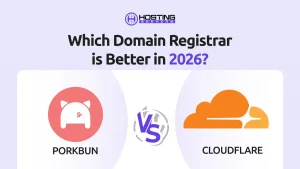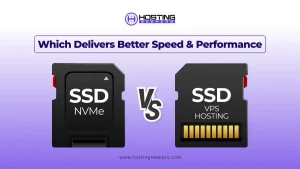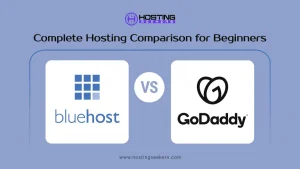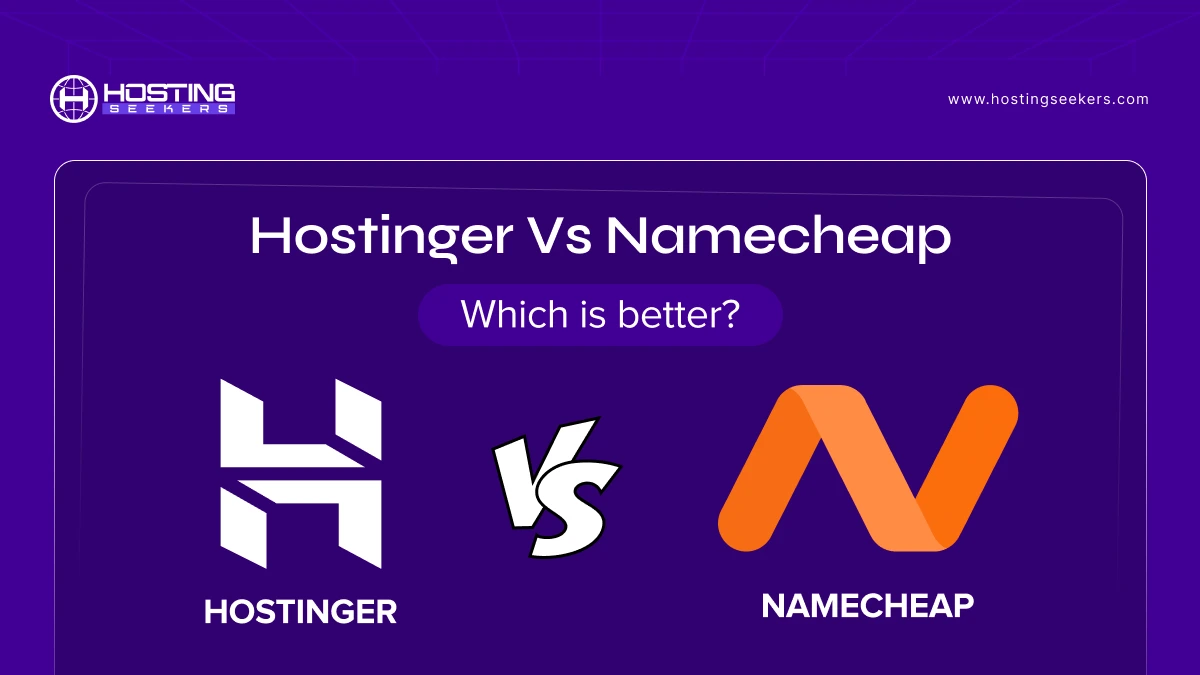
Hostinger Vs Namecheap: Which is better?
Comparison Updated on : December 31, 2025Hostinger and Namecheap are both among the best web hosting and domain registration providers that cater to a wide range of industries. Both offer affordable services with top-notch performance. However, when choosing between Hostinger and Namecheap, Hostinger is widely praised for its high-speed hosting and advanced features.
Also, it is widely preferred for its user-friendly interface, fast performance, and budget-friendly pricing, making it an excellent choice for beginners. Whereas Namecheap is frequently selected for its reliable domain registration services, familiar cPanel interface, and cost-effective plans, making it ideal for users who prioritize domain management and prefer working with cPanel.
At the same time, Namecheap has earned a reputation for budget-friendly domain registration and straightforward hosting solutions.
In this comparison guide of Hostinger vs Namecheap, we will break down their key features, performance, pricing, and support to help you decide which platform is the best fit for your website requirements.
About Hostinger
Launched in 2004, Hostinger is among the top names in web hosting, known for its cost-effective pricing and high-performance hosting solutions. Hostinger holds approximately 4.1% of the global web hosting market and powers about 1.43% of the top one million websites worldwide. It provides fast WordPress performance with a beginner-friendly dashboard, solid customer support, and tools like AI website builders, Hostinger Horizons AI app builder, and more.
Strengths and Weaknesses
| Strengths | Weakness |
| Cheap hosting plans | No phone support |
| User-friendly and intuitive Hpanel. | Renewal prices are high. It can be expensive in the long term. |
| Free domain and SSL certificate included. | Restricted free domain options. |
| Robust speed and performance due to robust features like LiteSpeed server, NVMe storage, and built-in caching. | |
| AI-powered website builders. | |
| Free services that include a free SSL certificate and website migration. |
About Namecheap
Since its founding in 2000, Namecheap has grown into a globally recognized domain registrar and hosting provider, managing more than 24 million domains. Known for affordability and reliability, it offers services ranging from domain registration and transfers to hosting options like shared, WordPress, VPS, reseller, and dedicated servers. With added layers of protection through SSL certificates, domain security, and a domain vault, Namecheap ensures a secure online presence for businesses and individuals alike.
Strengths and Weaknesses
| Strengths | Weakness |
| Cheap, affordable, and easy domain management. | Difficult to migrate. |
| Free domains, privacy protection, and migrations. | Restricted access to server settings. |
| cPanel access is more familiar to many users and provides more control over the backend. | May need more manual optimization. |
| It provides free WHOIS privacy. | Some users have pointed out hidden costs. |
Hostinger vs Namecheap: Services Comparison
| Service | Hostinger | Namecheap |
| Domain | Domain name search | Domain name search |
| Domain transfer | Domain transfer | |
| AI domain generator | New TLDS | |
| Handshake domain | ||
| Bulk domain search | ||
| WHOIS lookup | ||
| Premium DNS | ||
| Hosting | Web hosting | Shared hosting |
| Managed hosting for WordPress | Managed hosting for WordPress. | |
| Cloud hosting | Reseller hosting. | |
| VPS hosting | VPS hosting. | |
| Agency hosting | Dedicated server | |
| Managed hosting for WooCommerce | ||
| Minecraft hosting | ||
| Email hosting | Business email | |
| Migrate email | ||
| Anti-spam protection | ||
| Free Services | Free Domain | Free Domain |
| Auto Backups | Auto Backups | |
| Unlimited migrations for WordPress and open-source sites | Free WordPress and cPanel migration. | |
| Free up to 100 email accounts. | Free up to 30 email accounts. | |
| Free SSL certificate | Free SSL certificate. | |
| Free DNS | ||
| Marketing & AI Tools | Hostinger Horizons | Business starter kit |
| AI website builder | Business formation | |
| E-commerce website builder | Growth tools | |
| Design tools | ||
| Money-back guarantee | 30-day | 30-day |
Hostinger vs Namecheap: TLD Comparison
| TLD | Hostinger | Namecheap | ||
| Registered domains | Share | Registered Domain |
Share | |
| .com | 3,054,774 | 46.55% | 12,221,010 | 49.71% |
| .net | 548,741 | 8.36% | 938,172 | 3.82% |
| .org | 178,152 | 2.71% | 1,098,838 | 4.47% |
| .in | 439,040 | 6.69% | 102,494 | 0.42% |
| .info | 41,180 | 0.63% | 709,399 | 2.89% |
| .xyz | 120,368 | 1.83% | 955,925 | 3.89% |
| .io | 47,383 | 0.72% | 223,931 | 0.91% |
| .tech | 92,648 | 1.41% | 48,863 | 0.20% |
| .shop | 548,741 | 8.36% | 947,475 | 3.85% |
TLD Distribution Overview
| Hostinger | Namecheap | |
| TLDs the registrar works with | 274 | 495 |
| Registered domains | 6,562,944 | 24,583,176 |
| Global market share | 0.83% | 3.12% |
| Registrar ID assigned by ICANN (IANA ID) | 1636 | 1068 |
(Source: Namecheap Stats, Hostinger Stats)
Hostinger vs Namecheap: Hosting Plan Pricing
| Hosting Type | Hostinger | Namecheap |
| Web hosting (Shared Hosting) | $2.99/mo | $1.98/mo |
| Managed hosting for WordPress | $2.99 /mo | $9.88/mo |
| Cloud hosting | $ 7.99/mo | – |
| VPS hosting | $4.99/mo | $6.88/mo |
| Agency hosting | $ 29.00/mo | – |
| Managed hosting for WooCommerce | $ 3.99/mo | – |
| Minecraft hosting | $4.99/mo | – |
| Dedicated Servers | – | $54.88/mo |
When it comes to shared web hosting, both Hostinger and Namecheap offer budget-friendly options, but Namecheap edges ahead with a lower starting price of $1.98/month compared to Hostinger’s $2.99/month. This makes Namecheap an attractive choice for beginners and small websites looking for the most economical entry point.
For Managed Hosting for WordPress, the difference is more noticeable. Hostinger provides plans starting at just $2.99/month, which is very competitive for users seeking an optimized WordPress environment. On the other hand, Namecheap charges $9.88/month, a higher price point that additional premium features may justify, but it can feel expensive for budget-conscious users.
Hostinger also takes the lead in offering cloud hosting, starting at $7.99/month, a service that Namecheap does not currently provide. This gives Hostinger an advantage for users who need scalable and high-performance hosting solutions.
In terms of VPS hosting, Hostinger again offers a more affordable option at $4.99/month, while Namecheap’s VPS plans begin at $6.88/month. Hostinger also caters to niche needs with WooCommerce hosting ($3.99/month) and Minecraft hosting ($4.99/month), both services that Namecheap does not offer.
Hostinger vs Namecheap: Domain Pricing
| Domain | Hostinger | Namecheap |
| .com | $2.99/yr | $6.49/yr |
| .net | $11.99/yr | $12.98/yr |
| .org | $7.99/yr | $7.48/yr |
| .io | $31.99/yr | $34.98/yr |
When it comes to .com domains, Hostinger offers one of the lowest rates at just $2.99/year, making it highly affordable for individuals and businesses registering their first domain. Namecheap’s price for a .com domain is slightly higher at $6.49/year, though still competitively priced compared to many other registrars.
For .NET domains, both providers are close in pricing. Hostinger charges $11.99/year, while Namecheap is marginally higher at $12.98/year. This slight difference may not significantly impact cost, but Hostinger remains the more economical option.
The story shifts slightly with .org domains. Namecheap takes the lead, offering them at $7.48/year, somewhat cheaper than Hostinger’s $7.99/year. For users specifically looking for .org extensions, Namecheap provides better value.
Finally, for .io domains, which are popular among tech startups and modern web projects, both providers fall in a higher pricing range. Hostinger offers them at $31.99/year, while Namecheap charges $34.98/year. Once again, Hostinger comes in at the lower price point.
Hostinger vs Namecheap: Uptime Speed
Both Hostinger and Namecheap offer robust speed and performance. We have analyzed the performance of both websites through GTmetrix. Let’s check them out
Hostinger
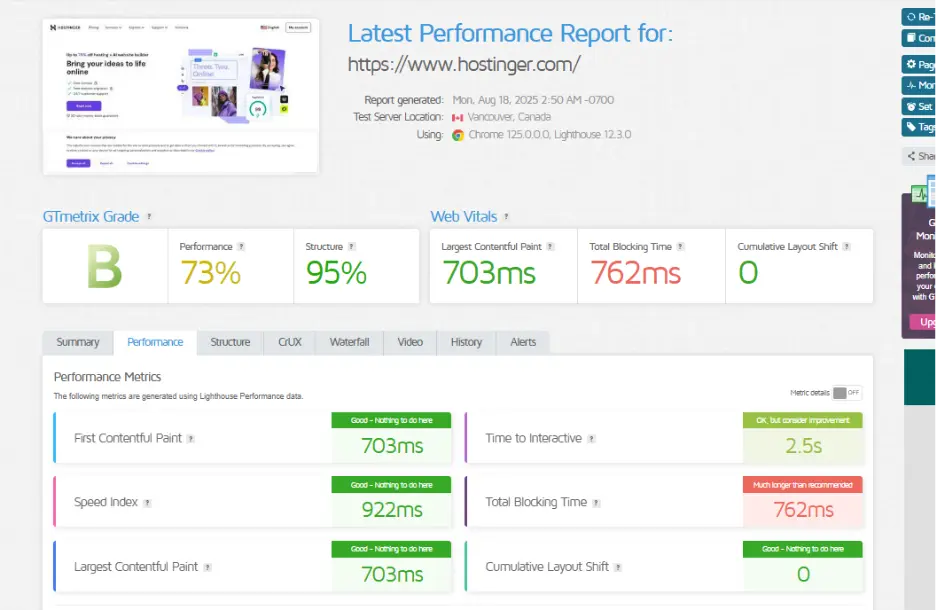
Hostinger, on the other hand, pushes performance optimization to the next level. Its GTmetrix report gives it a perfect 100% performance score and 100% structure score, which is rare to achieve. Hostinger’s First Contentful Paint (FCP) and Largest Contentful Paint (LCP) both stand at around 703 ms.
Despite that, Hostinger quickly takes the lead in other critical areas. The Total Blocking Time (TBT) is recorded at 0 ms, meaning no script-related delays are preventing the user from interacting with the site. This results in an outstanding Time to Interactive (TTI) of just 2.5 ms.
Equally important, Hostinger also delivers a Cumulative Layout Shift (CLS) of 0, ensuring the layout remains stable as it loads. Combined with its exceptional interactivity speed, Hostinger provides a smoother and more responsive user experience. Although Namecheap leads in pure LCP loading speed, Hostinger’s responsiveness, lack of blocking issues, and overall flawless optimization give it a stronger position in real-world usability.
Namecheap
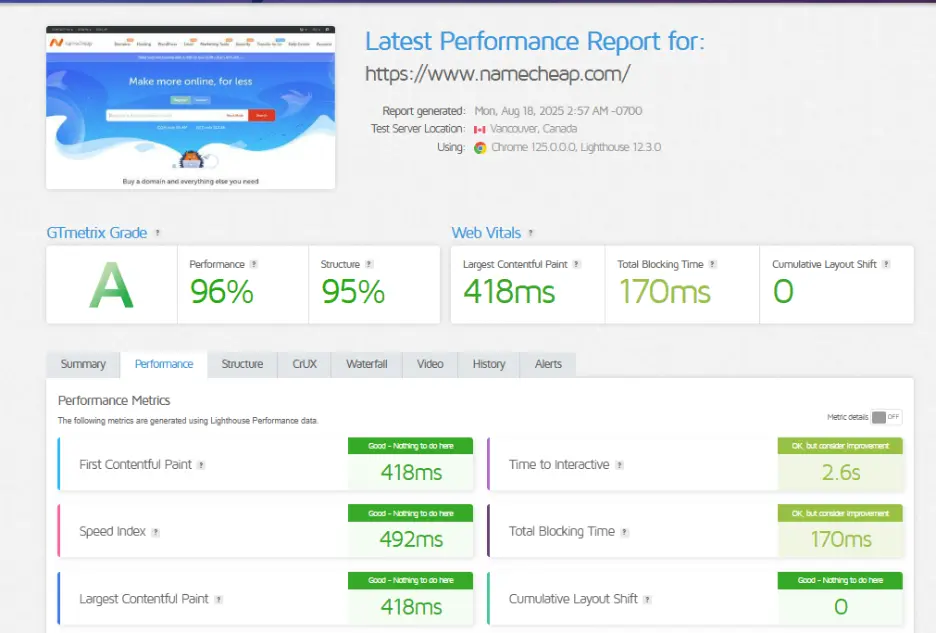
When it comes to performance, Namecheap demonstrates strong results with a GTmetrix grade of A, backed by a 96% performance score and 95% structure score. The website loads its main content extremely fast, with a Largest Contentful Paint (LCP) of just 418 ms, which is well within the recommended benchmark for a smooth browsing experience.
Similarly, the First Contentful Paint (FCP) also registers at 418 ms, ensuring users see visual elements almost immediately. Another positive aspect is the Cumulative Layout Shift (CLS) of 0, which means there are no unexpected jumps or shifts in design while the page loads, an essential factor for usability and accessibility.
However, despite these excellent numbers, Namecheap does show some limitations. The Total Blocking Time (TBT) of 170 ms is slightly on the higher side, suggesting that some background scripts are delaying full functionality. More importantly, the Time to Interactive (TTI) clocks in at 2.6 seconds, which is noticeably slower compared to Hostinger. While users can see the content quickly, they may not be able to interact with it right away. In short, Namecheap’s performance is stable and well-optimized for visual loading speed, but interactivity lags slightly behind.
Hostinger vs Namecheap: Privacy & Security
In terms of privacy and security, both providers offer robust security features that include a free SSL certificate, DDoS protection, Cloudflare, daily backups, Malware scans, WAF, and more.
| Hostinger | Namecheap | |
| Free SSL certificate | Yes | Yes |
| DDoS protection | Yes | Yes |
| Cloudflare | Yes | Yes |
| Daily Backups | Yes | Yes |
| Malware scans | Yes | Yes |
| WAF (Web Application Firewall) | Yes | Yes |
Hostinger
Hostinger provides robust security on all plans, including a web application firewall, scanning, and free WHOIS privacy to keep your info safe. They also utilize Cloudflare-protected nameservers to safeguard your website from suspicious attacks.
Namecheap
Namecheap provides robust security features to keep websites safe and reliable. Its protection suite includes SSL certificates, DDoS protection, Cloudflare integration, malware scanning, and SiteLock security tools. In case of a compromised or hacked site, Namecheap also offers assistance to help restore and fix the issue, which adds an extra layer of confidence for users.
Hostinger vs Namecheap: Customer Support
| Hostinger | Namecheap | |
| 24/7 support | Yes | Yes |
| Phone Support | No | No |
| Live chat | Yes | Yes |
| Email Support | Yes | Yes |
| Knowledge Base | Yes | Yes |
Both Hostinger and Namecheap offer comprehensive customer support to ensure users can get help whenever needed. They provide 24/7 support, allowing customers to reach assistance at any time. Both companies offer multiple contact channels, including live chat and email support, making it convenient to choose the preferred method of communication.
Additionally, each provides a detailed knowledge base, which includes guides, tutorials, and FAQs to help users solve common issues on their own. Overall, whether you prefer direct support or self-service resources, Hostinger and Namecheap customer support have you covered.
Hostinger vs Namecheap: Final Verdict
Choose Hostinger if;
You are a beginner and are looking for a user-friendly interface with the best hosting solutions.
Choose Namecheap if;
You need affordable domain services or a hosting option with the best domain management features.
Frequently Asked Questions
Q 1. Between Hostinger and Namecheap, which provider is better?
Ans. Hostinger is generally better for hosting due to its faster performance, optimized servers, and affordable pricing, while Namecheap is stronger in domain registration and works well for smaller websites.
Q 2. Is there anything better than Hostinger?
Ans. Yes, providers like SiteGround, A2 Hosting, and cloud solutions such as AWS or Google Cloud can offer better performance, scalability, and advanced features, though usually at higher costs.
Q 3. Is Namecheap suitable for hosting?
Ans. Yes, Namecheap is a good option for beginners and small websites, offering reliable uptime and budget-friendly plans. However, it may not perform as strongly as Hostinger for high-traffic or resource-heavy sites.
Q 4. How to migrate from Namecheap to Hostinger?
Ans. You can back up your website files and databases from Namecheap, upload them to Hostinger, adjust configuration settings, and update your domain’s DNS to Hostinger’s nameservers. Alternatively, Hostinger provides a free migration service to make the process easier.


